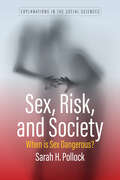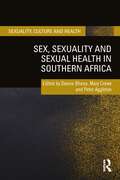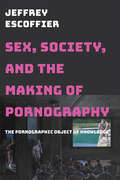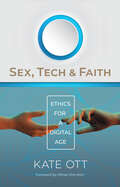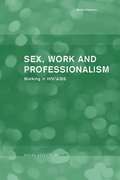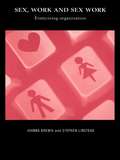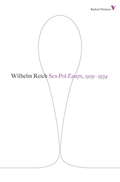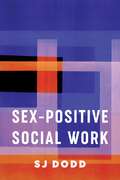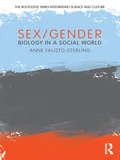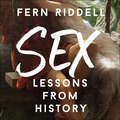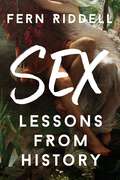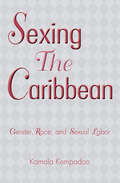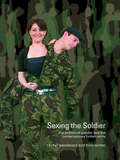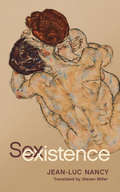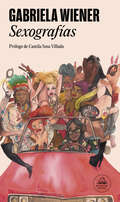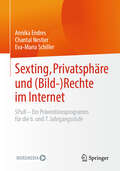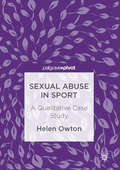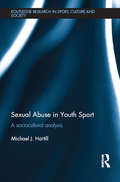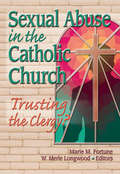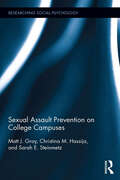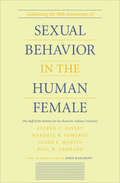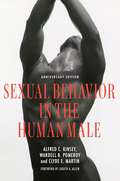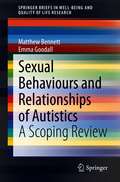- Table View
- List View
Sex, Risk, and Society: When Is Sex Dangerous? (Explanations in the Social Sciences)
by Sarah H. PollockWhen is sex abnormal and when is it dangerous? A multi-disciplinary approach that includes sociology, anthropology, history, and philosophy provides an understanding of how cultural norms have shifted over time and the implications of these shifts. Proposed definitions of “abnormal” and “dangerous” and their impact on public policies and practices are evaluated, as are our contemporary assumptions about sex and sexuality and the consequences of those assumptions. This should also serve as a toolkit for how to answer questions about sexuality such that readers can apply this model as new questions and social concerns about sex arise in the future.
Sex, Sexuality and Sexual Health in Southern Africa (Sexuality, Culture and Health)
by Deevia BhanaThis book—Sex, Sexuality and Sexual Health in Southern Africa—is structured around four major themes: gender and sexuality diversity; love, pleasure and respect; gender, sexual violence and health; and sexuality, gender and sexual justice. Chapters in this book analyse sexuality in relation to recent developments in the Southern African region and what this might mean for contemporary theory, policy and practice. Sex, sexuality and sexual health are often viewed through a narrow biomedical lens, ignoring the fact that they are profoundly social and historical in character. The contributors in this book bring to light the entanglements of sexuality with respect, recognition, rights and mutual respectful pleasure. Authors draw attention to partnerships, allyships and feminist, queer and trans coalitions in the pursuit of sexual health and justice in the region. The book will be of interest to final-year undergraduate and postgraduate students, researchers and activists as well as those working in Women and Gender Studies, Critical Sexuality Studies, Sexual and Reproductive Health, Development Studies, Public Health, Psychology, Education, Sociology and Anthropology.
Sex, Society, and the Making of Pornography: The Pornographic Object of Knowledge
by Jeffrey EscoffierHardcore pornographic films combine fantasy and real sex to create a unique genre of entertainment. Pornographic films are also historical documents that give us access to the sexual behavior and eroticism of different historical periods. This book shows how the making of pornographic films is a social process that draws on the fantasies, sexual scripts, and sexual identities of performers, writers, directors, and editors to produce sexually exciting videos and movies. Yet hardcore pornographic films have also created a body of knowledge that constitutes, in this digital age, an enormous archive of sexual fantasies that serve as both a form of sex education and self-help guides. Sex, Society, and the Making of Pornography focuses on sex and what can be learned about it from pornographic representations.
Sex, Tech, and Faith: Ethics for a Digital Age
by Kate OttA values-based, shame-free, pleasure-positive discussion of Christian ethics in response to a range of pressing issues in the digital age—including online pornography, dating apps, sexting, virtual-reality hookups, and sex robots.Digital innovation has rapidly changed the landscape of sexual experience in the twenty-first century. Rules-based sexual ethics, subscribed to by many Christians, are unable to keep up with new developments and, more often than not, seem effective at little other than generating shame.Progressive ethicist Kate Ott steps into this void with an expansive yet nuanced approach that prioritizes honesty and discernment over fear and judgment. Rather than producing a list of don&’ts, Ott considers the possibilities alongside the potential harm in everything from the use of internet porn to the practice of online dating to human-robot intimacy. With the aid of thought-provoking anecdotes and illuminating research, Ott invites readers to wrestle with the question of how to practice a just and flourishing sexuality in the digital age—and does so by drawing on core values of the Christian tradition.A rich resource for both individuals and groups, Sex, Tech, and Faith includes discussion questions at the end of each chapter for those considering these issues in community, as well as extensive youth study guides for parents, pastors, and teachers in need of age-appropriate means of beginning these difficult conversations with teens. Readers of all backgrounds and identities will be challenged to consider how their choices and habits in the digital world can lead to sexual health, wholeness, dignity, and fulfillment—for themselves and those in relationship with them.
Sex, Work and Professionalism: Working in HIV/AIDS (Social Aspects of AIDS)
by Katie DeverellSex, Work and Professionalism examines what happens when professional concern is defined in terms of sex. Based on original fieldwork with outreach workers in HIV prevention it addresses issues of professionalism, emotion work and boundaries, integrating empirical insights with sociological theory. In most professional relationships sex is not defined as part of the relationship, in fact it is explicitly excluded in guidelines and codes of ethics. HIV prevention outreach workers work in sexual environments with a sexually defined target group and are often employed on the basis of their sexuality. They have to learn how to balance their work and professional lives, overcoming conflicts such as: * professional role V community role * sexual skills V sexual boundaries * personal experiences V professional understanding * professional identity V worldviews. Many of the questions being raised in this book about the meaning of professionalism, the pain and pleasure in emotion work and the management of boundaries between home, sex and work are being asked more generally by workers in a range of organisations. Sex, Work and Professionalism argues for a new understanding of professionalism more appropriate to the human services.
Sex, Work and Sex Work: Eroticizing Organization
by Joanna Brewis Stephen LinsteadSex is much more rife in the workplace than many would think according to this fascinating and controversial new book. It argues that not only does sexuality pervade every aspect of organizations, but also that organization pervades every aspect of our sexuality. This two-way conceptualization lends the book a two-part structure, covering firstly the ways in which organizational behaviour is shaped through issues such as male managers' experience of violence, organizational constructions of sexual harassment, and professionals who work with sex offenders. The second part of the book examines how sex is organized for commercial purposes, and considers sex work as an industry which can be analyzed as any other, with important insights for normal organizing. Key features of the book include sections on: * organizing as sexual activity* connecting desire, the erotic, the abject and organization* the 'hidden' penetration of organization processes by sexuality* the 'dark side' of sex and organization and the importance of transgression* the double effect of discursive and material placing* organizing sexuality within prostitution* prostitution as a complex and varied industry. Fascinating and informative, this controversial book is a valuable source of information for postgraduates and researchers in the fields of business, management and sexuality and gender studies.
Sex-Pol
by Anna Bostock Lee Baxandall Wilhelm ReichThis volume contains the first complete translations of Wilhelm Reich's writings from his Marxist period. Reich, who died in 1957, had a career with a single goal: to find ways of relieving human suffering. And the same curiosity and courage that led him from medical school to join the early pioneers of Freudian psychoanalysis, and then to some of the most controversial work of this century--his development of the theory of the orgone--led him also, at one period of his life, to become a radical socialist.The renewed interest in Reich's Marxist writings, and particularly in his notions about sexual and political liberation, follows the radical critiques of Herbert Marcuse, Frantz Fanon and Paul Goodman, the political protest movements toward personal liberation in the present decade.
Sex-Positive Social Work
by SJ DoddSocial workers engage with sex and sexuality in all kinds of practice settings and with a variety of client populations. However, conversations about healthy sexuality and sexual well-being are all but absent from social work literature, education, and practice. Many social work professionals have internalized sociocultural taboos about talking about sexuality and tend to avoid the topic in their practice.This book provides an overview of key sexuality-related topics for social workers from a sex-positive perspective, which encourages agency in sexual decision making and embraces consensual sexual activity as healthy and to be enjoyed without stigma or shame. It discusses a wide range of topics including physiology, sexual and gender identity, sex in older adulthood, BDSM and kink; nonmonogamous and polyamorous relationships, and ethical considerations, including erotic transference. The book is designed to embolden social workers to engage discussions of sexuality with clients and to provide an opportunity for self-reflection and professional growth. Accessible to students as well as social workers and mental-health professionals at all levels, Sex-Positive Social Work emphasizes the relationship between sexual well-being and overall well-being, giving social workers the tools to approach sex and sexuality actively and positively with clients.
Sex/Gender: Biology in a Social World
by Anne Fausto-SterlingSex/Gender presents a relatively new way to think about how biological difference can be produced over time in response to different environmental and social experiences. This book gives a clearly written explanation of the biological and cultural underpinnings of gender. Anne Fausto-Sterling provides an introduction to the biochemistry, neurobiology, and social construction of gender with expertise and humor in a style accessible to a wide variety of readers. In addition to the basics, Sex/Gender ponders the moral, ethical, social and political side to this inescapable subject. An interview with the author! WOMR - The Lowdown with Ira Wood - Sex an Gender Identity with Anne Fausto-Sterling: http://www.publicbroadcasting.net/womr/.jukebox?action=viewMedia&mediaId=1025429
Sex: Lessons From History
by Fern RiddellA powerful new cultural history of sex written by one of the UK's most prominent historians.Sex, for the entirety of human history, has never been about reproduction. Statistically speaking, only one out of every one thousand sexual acts between a man and a woman will result in a pregnancy. And, as we know, sex does not solely take place just between men and women.So: what is sex for? In this wide-ranging and powerful new history of sex, Dr Fern Riddell will uncover the sexual lives of our ancestors and show that, just like us, they were as preoccupied with sexual identities, masturbation, foreplay, sex and deviance; facing it with the same confusion, joy and accidental hilarity that we do today. By looking at how history has dealt with different parts of our sexual experience, we're taken on an illuminating and entertaining journey about why we have sex - and what that means today.(P)2021 Hodder & Stoughton Limited
Sex: Lessons From History
by Fern RiddellOut now: the new book by Dr Fern Riddell, a powerful and entertaining history of sex. Revised and updated. __________These are the facts: throughout history human beings have had sex. Sexual culture did not begin in the sixties. It has always been celebrated, needed, wanted and desired part of what it means to be human.So: what can learn by looking at the sexual lives of our ancestors? What does it tell us about our attitudes and worries today, and how can the past teach us a better way of looking forward?In this wide-ranging and powerful new history of sex, Dr Fern Riddell will uncover the sexual lives of our ancestors and show that, just like us, they were as preoccupied with sexual identities, masturbation, foreplay, sex, deviance; facing it with the same confusion, joy and accidental hilarity that we do today.Sex: Lessons from History is a revealing and fascinating look at how we've always been obsessed with how sex makes us who we are.__________
Sex: Lessons From History
by Fern RiddellOut now: the new book by Dr Fern Riddell, a powerful and entertaining history of sex. Revised and updated. __________These are the facts: throughout history human beings have had sex. Sexual culture did not begin in the sixties. It has always been celebrated, needed, wanted and desired part of what it means to be human.So: what can learn by looking at the sexual lives of our ancestors? What does it tell us about our attitudes and worries today, and how can the past teach us a better way of looking forward?In this wide-ranging and powerful new history of sex, Dr Fern Riddell will uncover the sexual lives of our ancestors and show that, just like us, they were as preoccupied with sexual identities, masturbation, foreplay, sex, deviance; facing it with the same confusion, joy and accidental hilarity that we do today.Sex: Lessons from History is a revealing and fascinating look at how we've always been obsessed with how sex makes us who we are.__________
Sexing the Caribbean: Gender, Race and Sexual Labor
by Kamala KempadooThis unprecedented work provides both the history of sex work in this region as well as an examination of current-day sex tourism. Based on interviews with sex workers, brothel owners, local residents and tourists, Kamala Kempadoo offers a vivid account of what life is like in the world of sex tourism as well as its entrenched roots in colonialism and slavery in the Caribbean.
Sexing the Caribbean: Gender, Race and Sexual Labor
by Kamala KempadooThis unprecedented work provides both the history of sex work in this region as well as an examination of current-day sex tourism. Based on interviews with sex workers, brothel owners, local residents and tourists, Kamala Kempadoo offers a vivid account of what life is like in the world of sex tourism as well as its entrenched roots in colonialism and slavery in the Caribbean.
Sexing the Soldier: The Politics of Gender and the Contemporary British Army (Transformations)
by Rachel Woodward Trish WinterSexing the Soldier takes a critical look at how gender - what it means to be a man or a woman - is understood within the contemporary British Army, and the political and practical consequences of this. Drawing on original research, this informaive volume looks at: the history and structure of the British Army as a masculine institution personnel policies which deal with gender issues the construction of ideas about military masculinities and femininities within the Army media representations of the figure of the soldier. Using case studies ranging from the exclusion of women from direct combat posts, to the issues surrounding bullying, this book argues that we need a fuller, more nuanced assessment of gender issues in the military that moves beyond the simplistic ideas about women's and men's 'natural' capacities for soldiering.
Sexistence
by Jean-Luc NancySex, more than just a part of our experience, troubles our conceptions of existence. Drawing on a fascinating array of sources, ancient and modern, philosophical and literary, Jean-Luc Nancy explores and upholds the form-giving thrust of the drive. Nancy reminds us that we are more comfortable with the drama of prohibitions, ideals, repression, transgression, and destruction, which often hamper thinking about sex and gender, than with the affirmation of an originary trouble at the limits of language that divides being and opens the world.Sexistence develops a new philosophical account of sexuality that resonates with contemporary research on gender and biopolitics. Without attempting to be comprehensive, the book ranges from the ancient world through psychoanalysis to discover the turbulence of the drive at the heart of existence.
Sexografías
by Gabriela WienerEdición ampliada de las crónicas sexuales de Gabriela Wiener, un recorrido temerario y trepidante por el lado más salvaje del periodismo narrativo, con prólogo de Camila Sosa Villada. «Gabriela Wiener es una fuerza de la naturaleza y así escribe: un terremoto sobre nuestros tabúes y prejuicios. Este es un libro inteligente y delicioso».María Fernanda Ampuero «Gracias a Belcebú por la mano atrevida de Gabriela Wiener y por su libro, que desorienta a cualquiera que cree sabérselas todas sobre sexo. [...] Este libro es una criatura con sus propios caprichos, que conoce bien el camino al éxtasis, que entristece y desboca como cualquiera de nosotros. Una Wiener que se queda sobre nuestro pecho derramando preguntas mortales como un veneno. La incógnita sobre el sexo, sobre su estrategia para sobrevivir, renovarse y asegurar su perpetuidad. Cuán lejos podemos llegar para sentir algo, qué tan abajo, qué tan arriba y dónde se refugia nuestro placer. A pesar de haber sido escrito durante las últimas dos décadas, Sexografías me hizo pensar en lo necesario que es el sexo para nuestra cultura. Lo tengamos o no, lo deseemos o no. [...] ¿Que si me calenté al leer Sexografías? Sí. ¿Leyendo crónicas periodísticas? Sí. [...] Este libro no pide piedad, pero exige que no mezquinemos cuerpo como lectores. Si la escritora vende así su alma al diablo por la palabra, por qué nosotros no responder con la misma entrega».Del prólogo de Camila Sosa Villada Reseñas:«Gabriela Wiener es un fenómeno de la naturaleza que es un fenómeno de la literatura que es un fenómeno en sentido lato. Una vez, siendo jefa de redacción de un diario español, leí Sexografías y la llamé por teléfono. La llamé un minuto después de cerrar el libro, urgentemente. Cuando la tuve delante, reconocí a la jefa de la tribu. Otra vez leí Sexografías y abandoné el periodismo durante mucho tiempo. Hoy leo Sexografías y confirmo aquellas sospechas: es posible anudar creación, periodismo, compromiso y humor. Ella lo hace aquí. Gabriela Wiener existe».Cristina Fallarás «Gabriela Wiener se pasea por los mundos del sexo como una antropóloga curiosa que visita un planeta de alienígenas: observadora, detallista, divertida, aguda y atinada traductora del disparate de la vida».Rosa Montero «Este libro me cambió la vida y me la vuelve a cambiar cada vez que lo releo. En Sexografías, el sexo es un camino sutil que Wiener toma para armar una voz y dibujar una teoría implícita y profunda sobre el mundo y el sentido de experimentarlo, vivirlo y conquistarlo».Tamara Tenenbaum «Tan deliciosamente escrito como excitante y riguroso: libro de culto para el cuerpo, el deseo, el goce y el fin de los traumas. Leer Sexografías es disfrutar de una escritora exquisita yferoz».Cristian Alarcón «La nueva edición de este clásico contemporáneo multiplica su interés original gracias a la calidad y el jugo de sus renovaciones. Sexografías se nos presenta más ágil y valeroso que nunca».Elisa Victoria
Sexting, Privatsphäre und (Bild-) Rechte im Internet: SPuR - Ein Präventionsprogramm für die 6. und 7. Jahrgangsstufe
by Eva-Maria Schiller Annika Endres Chantal NestlerDieses Fachbuch enthält ein schulklassenbasiertes Durchführungsmanual für Lehrkräfte, Schulsozialarbeiter:innen, Schulpsycholog:innen und weitere an Schulen tätige Trainingskräfte. Das Ziel des SPuR-Präventionsprogramms ist es, frühzeitig einen kompetenten Umgang mit Bildmaterial im Netz zu fördern und der missbräuchlichen Verbreitung von freizügigen Fotos vorzubeugen. Zielgruppe des Programms sind Schüler:innen der 6. und 7. Jahrgangsstufe. In fünf Modulen beschäftigen sich die Schüler:innen mit den Themen Privatsphäre im Internet und dem Austausch von freizügigen Fotos über soziale Medien (sog. Sexting). Was möchte man von sich selbst preisgeben? Welche Gefahren gibt es? Wie kann man sich schützen? Und was kann man tun, wenn ein freizügiges Foto öffentlich geworden ist?Das von Schulpsychologinnen entwickelte, wissenschaftlich fundierte und erprobte SPuR-Präventionsprogramm wird im Buch ausführlich und praktisch erläutert, so dass Sie das medienpädagogische Programm selbstständig an Ihrer Schule durchführen können. Das Buch enthält zudem Hinweise für die Elternarbeit und ergänzende Online-Materialien.
Sexual Abuse in Sport
by Helen OwtonThis book is about sexual abuse in sport, and specifically about one girl's experience of long-term chronic abuse in sport. A 'non-conventional' approach is employed to explore the experiences of a female athlete named Bella who was groomed, sexually abused by her male coach, and then subjected to years of athlete domestic violence. Through a collaborative auto-ethnography process, these experiences are reported through vignettes and selected poems seeking to involve the reader in the grooming process of a young female athlete, so that they might react from the different social positions they currently occupy. Bella's story acts as a pedagogical resource in ways that stimulate ethical discussions and enhance knowledge of sexual abuse in sport, by assisting those involved to better understand their own 'field' and the dynamics of abuse within it, in order to develop effective abuse prevention strategies.
Sexual Abuse in Youth Sport: A sociocultural analysis (Routledge Research in Sport, Culture and Society)
by Michael J. HartillCases of sport-related child sexual abuse have received increasing news coverage in recent years. This book documents and evaluates this important issue through a critical investigation of the research and theory on sexual violence and child sex offending that has emerged over the past thirty years. Based on life-history interviews with male and female ‘survivors’ of child sexual abuse in sport, this text offers a deeper appreciation for the experiences of those who are sexually victimized within sports and school-sport settings. Drawing on a wide range of sources, it also provides a new theoretical framework through which child sexual abuse in sport may be explored. Offering a critique spanning psychology, sociology and criminology, this book challenges existing theories of sex offending while advocating an alternative epistemology to help better understand and address this social problem. Presenting an original sociological approach to this field of study, Sexual Abuse in Youth Sport is important reading for any researcher, policy-maker or practitioner working in youth sport, physical education, sports coaching, sport policy, child protection or social work.
Sexual Abuse in the Catholic Church: Trusting the Clergy?
by Merle LongwoodExamine the reactions of leading clergy to the Catholic Church sex abuse scandal! Sexual Abuse in the Catholic Church is an eye-opening collection of Catholic and non-Catholic perspectives, statements, and responses regarding Catholic clergy sexual abuse from a public symposium entitled "Trusting the Clergy?" This book includes the viewpoints of some of today&’s most influential members of the Catholic Church, such as Archbishop Harry J. Flynn, Bishop Howard Hubbard, and Father Donald B. Cozzens. It will bring you up to date on the ways in which the American Catholic bishops have dealt, or are attempting to deal, with the sexual abuse scandal. In Sexual Abuse in the Catholic Church, Archbishop Harry J. Flynn offers a bishop&’s perspective on the sexual abuse crisis and describes how the United States Catholic Conference of Bishops (USCCB) has responded to issues of clergy sexual abuse since the 1980s. Fr. Donald B. Cozzens summarizes what has been learned from the clergy abuse crisis, and then moves to the systemic issues that need to be addressed-not just personal relationships but issues of structure and meaning. This book also includes viewpoints about the Catholic Church from renowned scholars and non-Catholic church leaders, including Michael J. Bland and Rev. Dr. Marie M. Fortune. This book offers presentations on: the Charter for the Protection of Children and Young People created by the United States Catholic Conference of Bishops (USCCB) the need for the Catholic hierarchy to convert from "an institutional protection agenda" to "a justice-making agenda" understanding the abusers&’ modes of operation and motivations identifying future potential sexual abusers attempting to enter the priesthood including the sexual abuse of adults as well as children as future agenda issues the data the Church compiles on the numbers of perpetrators, victims, and costs associated with the scandal determining whom to believe when there are conflicting stories the impact of the clergy sexual abuse crisis on Latino and African-American communities Sexual Abuse in the Catholic Church provides a historical marker for the state of the church&’s discussion one year after the Boston Archdiocese was faced with intense media scrutiny resulting in the resignation of Cardinal Bernard Law. This book is a unique collection of credible, diverse voices engaged in public discussion of a difficult social problem facing the church. Use it to formulate your own opinion on how the Catholic community is responding to the sexual abuse scandal.
Sexual Assault Prevention on College Campuses (Researching Social Psychology)
by Matt J. Gray Christina M. Hassija Sarah E. SteinmetzSexual assault continues to be a problem on college campuses despite greater attention to reducing rates of assault and an increased presence in the public discourse. Programming has been historically directed towards women by providing them with information about how to keep themselves safe rather than confronting a climate conducive to sexual violence. This important volume illuminates the urgency of combating sexual violence on college campuses. The authors depict in detail empirically supported approaches to combating climates conducive to sexual violence and ways to empower all members of the campus community to actively prevent sexual violence.
Sexual Behavior in the Human Female (Encounters: Explorations in Folklore and Ethnomusicology)
by Alfred C. Kinsey Wardell B. Pomeroy Clyde E. Martin Paul H. GebhardThe groundbreaking Kinsey Report study on female sexuality from &“one of the most influential figures in American intellectual history&” (The New York Times). Originally published in 1953, the material presented in Sexual Behavior in the Human Female was derived from personal interviews with nearly 6,000 women; from studies in sexual anatomy, physiology, psychology, and endocrinology. The study revealed the incidence and frequency with which women participate in various types of sexual activity and how such factors as age, decade of birth, and religious adherence are reflected in patterns of sexual behavior. The authors make comparisons of female and male sexual activities and investigate the factors which account for the similarities and differences between female and male patterns of behavior and provide some measure of the social significance of the various types of sexual behavior. &“[It] shocked the world in 1953 with its explicit revelations. Countries banned it. Churches berated it. Some scholars scoffed . . . but it was an instant success, selling 270,000 copies in less than a month . . . [Kinsey] made headlines around the globe with his findings on such things as masturbation, sex before marriage and adultery.&”—CBSNews.com
Sexual Behavior in the Human Male
by Alfred C. KinseyWhen published in 1948 this volume encountered a storm of condemnation and acclaim. It is, however, a milestone on the path toward a scientific approach to the understanding of human sexual behavior. Dr. Alfred C. Kinsey and his fellow researchers sought to accumulate an objective body of facts regarding sex. They employed first hand interviews to gather this data. This volume is based upon histories of approximately 5,300 males which were collected during a fifteen year period. This text describes the methodology, sampling, coding, interviewing, statistical analyses, and then examines factors and sources of sexual outlet.
Sexual Behaviours and Relationships of Autistics: A Scoping Review (SpringerBriefs in Well-Being and Quality of Life Research)
by Emma Goodall Matthew BennettThis SpringerBrief provides readers with a comprehensive snapshot of contemporary research about autistics and their experiences and insights of sexual behaviours and interests. The authors use a scoping review approach to canvass the diverse literature on this topic. This approach shows many gaps in scholarly understanding about autistics and their experiences and insights of sexual interests and behaviours. Some of the gaps relate to sex education, gender dysphoria and gender reassignment surgery, pregnancy and childbirth, and domestic violence experiences of autistics. The book addresses these gaps and provides explanations and recommendations for further research.
